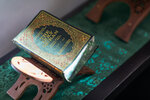
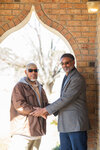
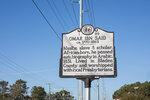
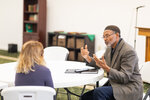
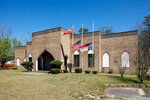
Visitors to the Masjid Omar Ibn Sayyid on Murchison Road in Fayetteville remove their shoes in the foyer before stepping onto the mosque’s plush green and gold carpet in a large prayer room where worshippers gather on Fridays for the Jummuah Salat — a sacred congregational prayer in the Islamic faith.
It is Tuesday in Fayetteville, a sunny winter morning.
Facing toward the holy city of Mecca in Saudi Arabia, David Haskins recites his midday prayers, kneeling in prostration, his head touching the carpet. It’s one of five prayers he will deliver at specific times during the day.
For deeply devout Muslims, Islam is more than a religion. It is a way of life devoted to the oneness of God as the creator and center of everything, Haskins said. As the chairman of the Islamic Center of Fayetteville, he serves in an administrative leadership position rather than a religious one.
“Our role on earth is to honor the creator and worship in this life he has given us,” Haskins said.
Whether working, resting, earning a living, supporting families, or giving to charity, the Muslim faithful live a life of devotion to God.
“Every aspect of our lives, how we treat our families, how we treat our neighbors, and how we treat other people, is part of our worship,” Haskins said.
The foundations of Islam and the month of Ramadan
March marks one of the most important Islamic holy observances. Ramadan is in the ninth month of the Islamic year and is based on the lunar calendar. It starts on the first evening of the new moon and follows the complete lunar cycle, lasting about 30 days. This year, Ramadan starts on March 10 and ends on April 9.
Ramadan is a month of fasting and spiritual growth through discipline and abstaining from temptations and bad habits. From dawn to dusk each day, Muslims avoid food and drink, including water. The length of each fasting day varies according to regional daylight hours.
This practice bonds Muslims closer to God and teaches individuals to feel compassion toward others, Muslim leaders say.
For Bobby Thomas, the imam — or spiritual leader — at the Masjid Omar Ibn Sayyid, the sacrifices during Ramadan inspire empathy toward those less fortunate.
“I did administrative work in my career, so for me to complain about fasting inside an air-conditioned building all day long was not reasonable, knowing there are people who can’t afford to eat every day,” he said.
Ramadan ends with the festival of Eid al-Fitr, a day devoted to praying and celebrating with family and friends.
Islam is founded on the Five Pillars. The first is the declaration of faith, submission, and dedication to believing there is only one God who sent his messenger, the Prophet Muhammad, to guide humankind.
The Pillars also include obligatory prayers observed before dawn, at sunrise, midday, at sunset, and at night; worshiping God by giving to charity and helping those less fortunate; fasting during Ramadan; and making a pilgrimage to Mecca to strengthen faith and devotion.
For Muslims who seek a roadmap on how to live their lives, they rely on the Quran, the word of God. The holy book contains complete guidance for mankind to maintain a social order of equity and justice toward one another, Haskins said. He describes the Quran as the “final revelation from God, and is designed to be recited out loud.”
“It is a recitation that’s not poetry, but it’s poetic. It’s not music, but it’s musical. It’s not science but it is scientific,” he said. “There is a flow to it and a sweetness to it and a rhythm to it. It’s principled and timeless.”
The history of Omar Ibn Said and the mosque
Travelers along Murchison Road may spot a historical marker on the edge of the Masjid Omar Ibn Sayyid’s vast front lawn, one of a handful of mosques in Fayetteville. The marker honors the life of the mosque’s namesake, Fulani scholar Omar Ibn Said, who was brought against his will from Futa Toro (now Senegal) to America in 1807 as an enslaved individual along with many other West African people.
He was taken to Charleston to work as an enslaved person but escaped from his cruel enslaver and made his way to Fayetteville where he was captured and jailed. Eventually he was bought as property by James Owen, whose brother, John Owen, served as North Carolina’s 24th governor.
Omar Ibn Said eventually moved to Bladen County with the Owen enslavers where he lived until his death in 1864 at the age of 94. He is buried in the family cemetery.
“He was a scholar who studied under religious leaders in Senegal, and his life was remarkable,” Thomas said.
In 1831, Omar wrote an autobiography in Arabic, delivering a significant narrative of his life as an enslaved individual. It was the only such work written by an enslaved person in Arabic. Although he attended a Presbyterian church with the Owens, Thomas and other local Muslims believe he never embraced Christian beliefs.
In 2010, the N.C. Dept. of Cultural and Natural Resources established a historical marker honoring Omar Ibn Said and placed it at the mosque named after him.
The Islamic Center of Fayetteville, established in 2008, serves as a resource center and a masjid where the faithful can come to engage in their daily prayers, gather for Friday services and attend educational and community programs.
“We are not exclusively the religious body for Islam for the area, but we wanted to establish an Islamic Center as a convenient center for people to worship and pray,” Haskins said.
The Center is housed in a former Jehovah’s Witness Kingdom Hall at 2415 Rosehill Road in Fayetteville, purchased in 2018.
Individuals of other faiths are also welcome at the Islamic Center, including a local group of homeschooled children who have visited to learn about world religions, Haskins said.
“We’ve hosted Scout troops and other groups for presentations, too, and we welcome anyone who has questions or wants to know about Islam,” he said. “It’s one of the ways we perform outreach.”
Another way to reach the public is to do good deeds and demonstrate compassion for others.
“We’re not trying to convert people to our traditional way of thinking, but it’s important for us to give clarity to what Islam is and what it is not,” Thomas said. “That’s the type of outreach we do.”
What commitment to the Islamic faith looks like
Thomas, Haskins and the Center’s facilities manager Ajmal Heshaam gathered to discuss their personal relationships with Islam and how they fit their everyday lives around their daily prayers and commitment to their faith.
Haskins, who served for 24 years in the U.S. Air Force, says he started his journey into Islam over 50 years ago when he was in high school.
“Like some people, it took time for me to reach full participation,” he said. “There are those who are still on their journey, who are believers but not practicing, and we accept them.”
Being Muslim in Fayetteville is not difficult or complicated, the men agree. The three, now retired, no longer need to negotiate time off for their prayers with supervisors or punch time clocks.
“When I was in the workforce, I sometimes had to schedule my work around meetings and prayers, but generally speaking, those who are committed to Islam and focused on satisfying their religious obligations will find a way and it’s not a burden,” Heshaam said. “It was never a problem for me at work.”
And while the prayers are on an established schedule, Islam allows for some flexibility.
As a soil scientist for Cumberland County, Heshaam often found himself driving in his car all day, through at least two prayer times, so he prayed in his car.
“I couldn’t do every prayer in the ritual movement — the prostration, but I could say them out loud while driving,” he said.
A former deputy sheriff, Thomas often found himself on duty at the county jail during the Friday congregational prayer time, and successfully negotiated with his supervisor to extend his Friday lunch hour to allow for enough time to go to the mosque to pray.
“I explained that Friday prayers are a 1,400-year tradition and I couldn’t change the day or time,” he said. “We worked it out, and it wasn’t a problem. Even if there is pushback, remember we do have protections for freedom of religion here.”
While their experiences of practicing their religion have been positive, the men acknowledge there is a misconception about Islam in the United States.
“I came to Islam in the 1970s when nobody knew anything about Muslims, and there were hardly any Islamic institutions as there are now,” Haskins said. “Islam is not an organization. It is not tied to race or culture or ethnicity. It is a way of life, based on the belief in one creator who sent prophets to help people stay on the correct course.”
At its essence, Islam is surrendering to God willingly without compulsion or force, he said.
He calls upon people to educate themselves and go to reputable sources to learn about the religion of Islam, rather than media sources that portray Islam as a threat to American people.
Rather, Thomas said, Islam is focused on peace in three parts.
“Islam is the practice of submitting one’s will to God. Muslim is an individual who submits his will to God, and Salam is the peace that comes with submitting your will to God,” Haskins said. “Islam is a religion of peace and a religion of submission — peace through submission.”